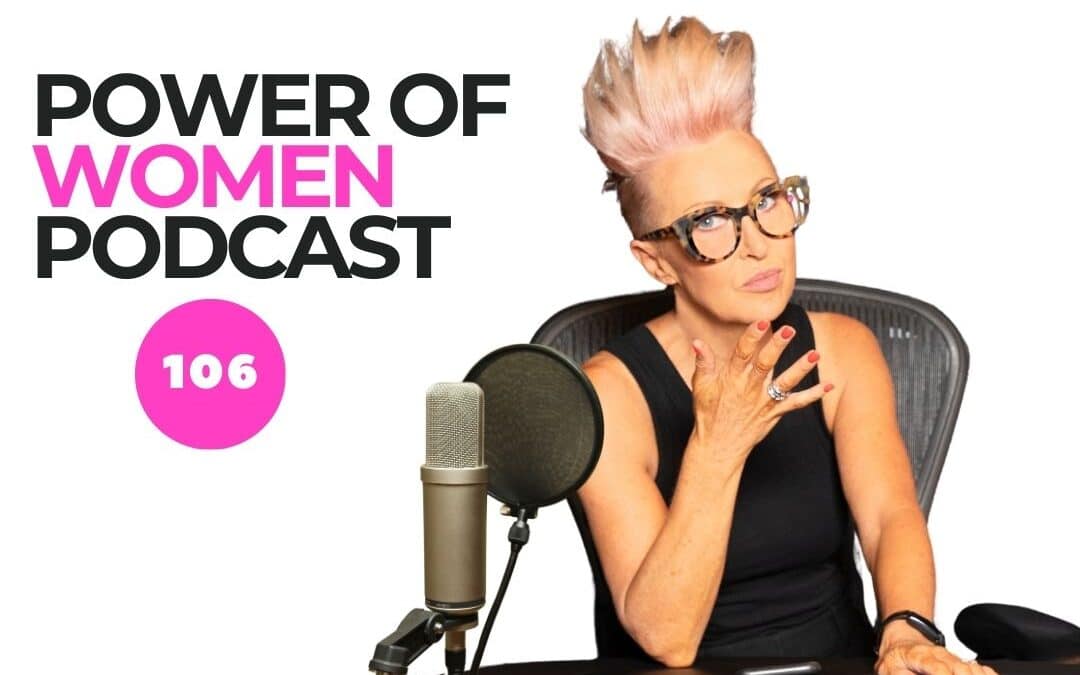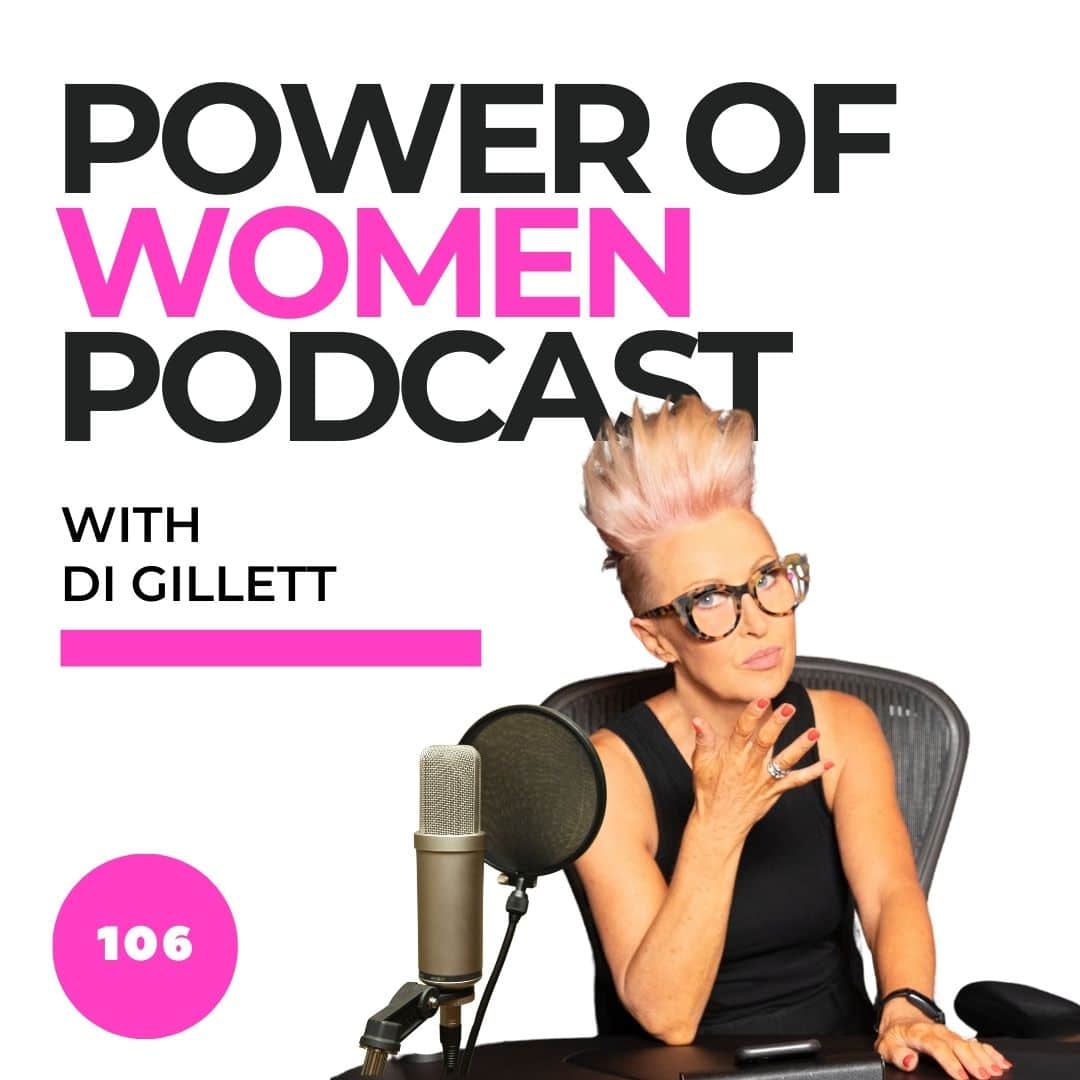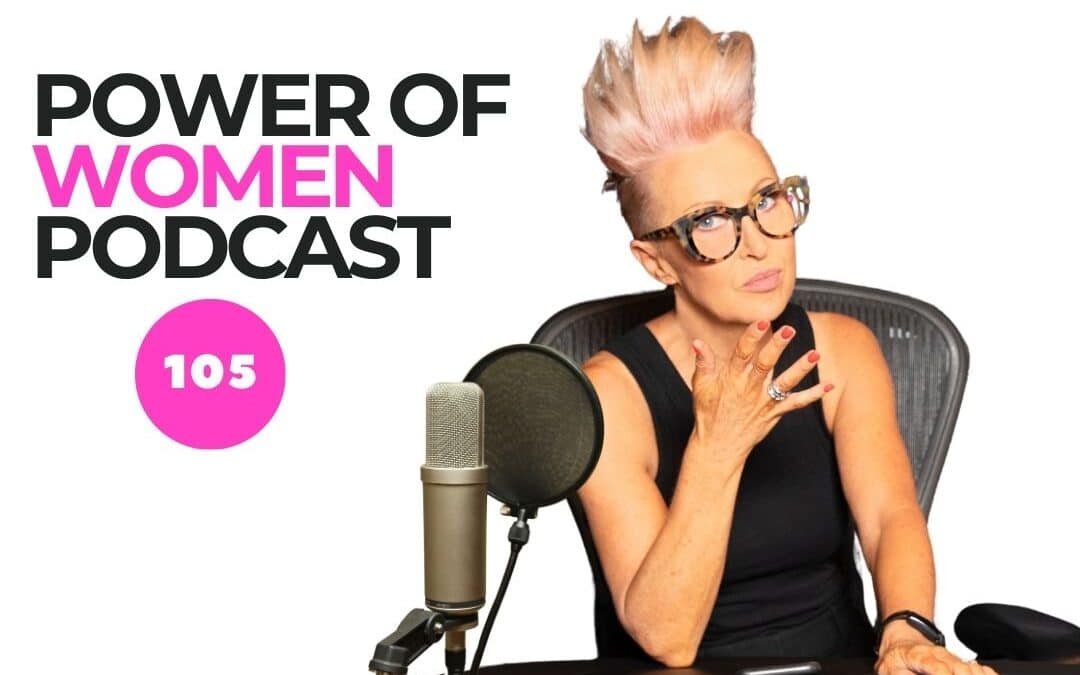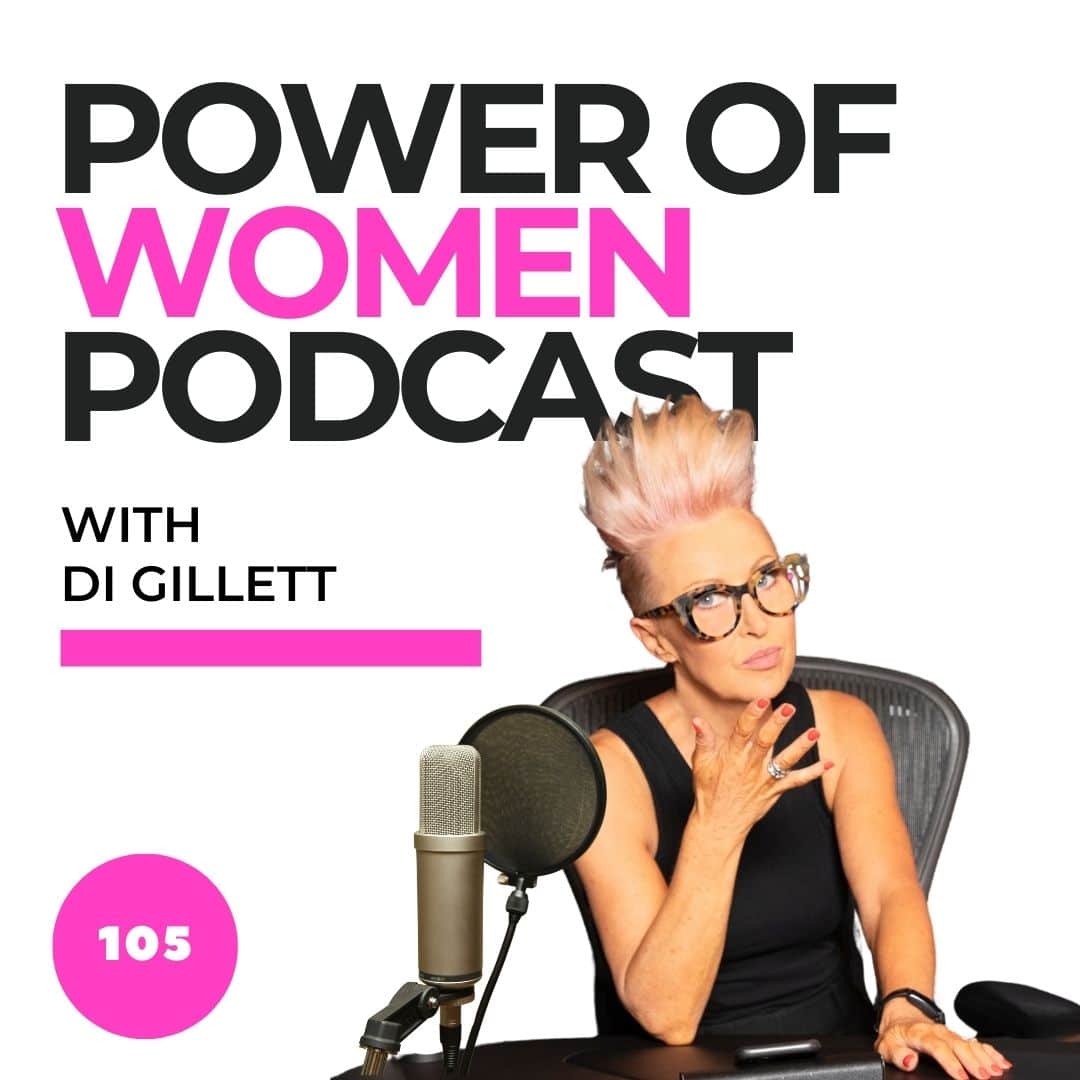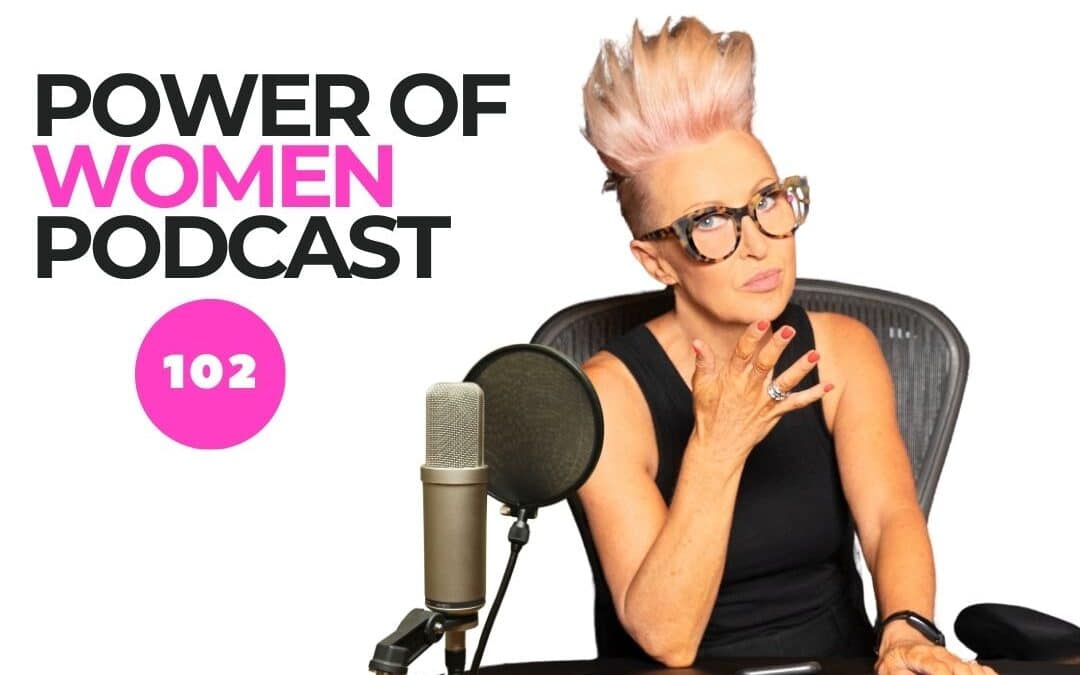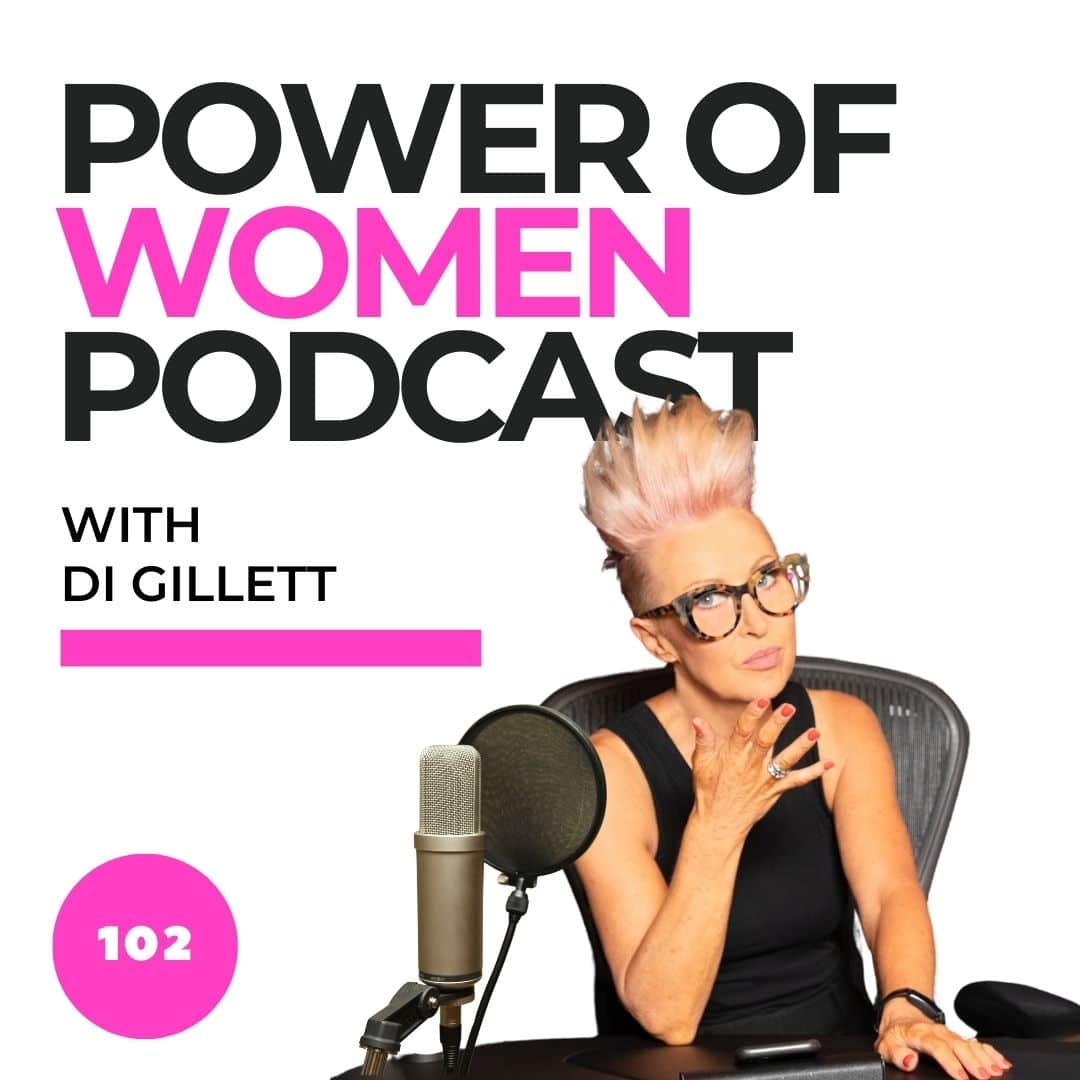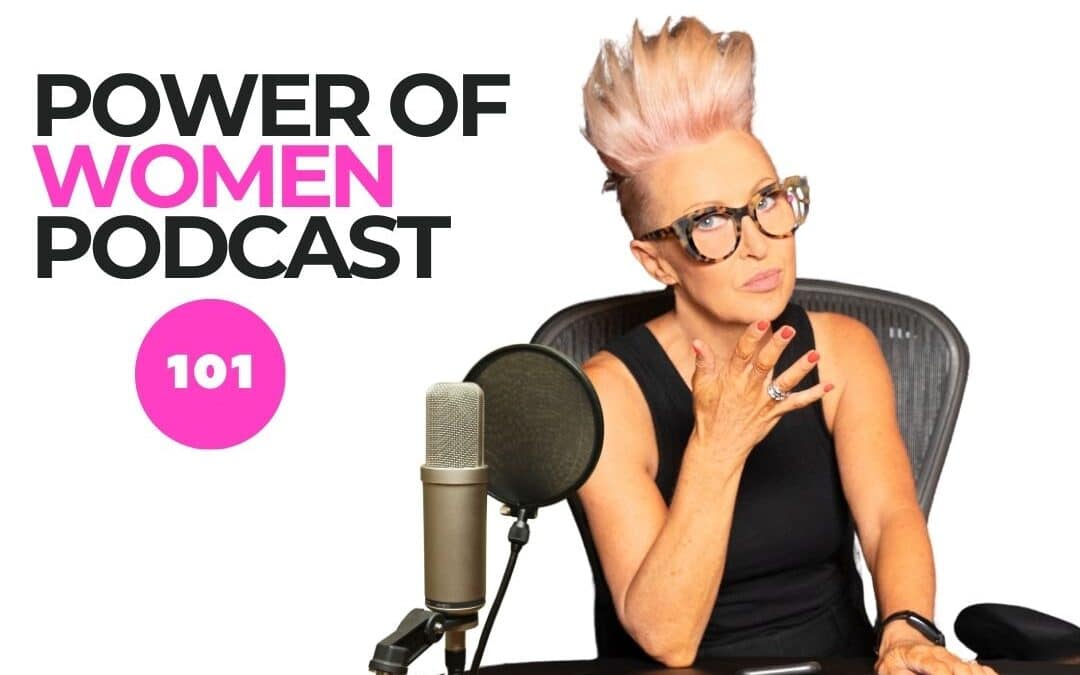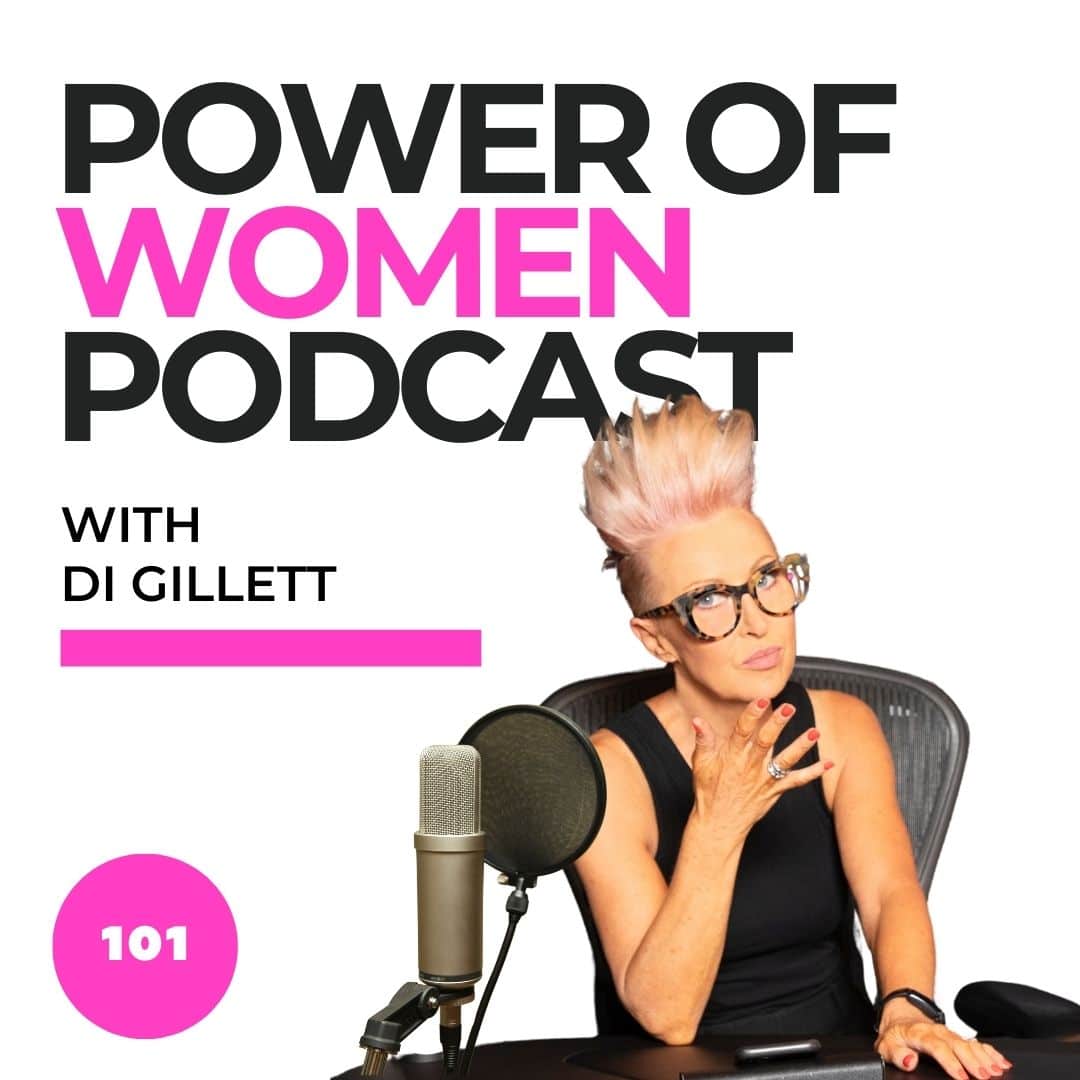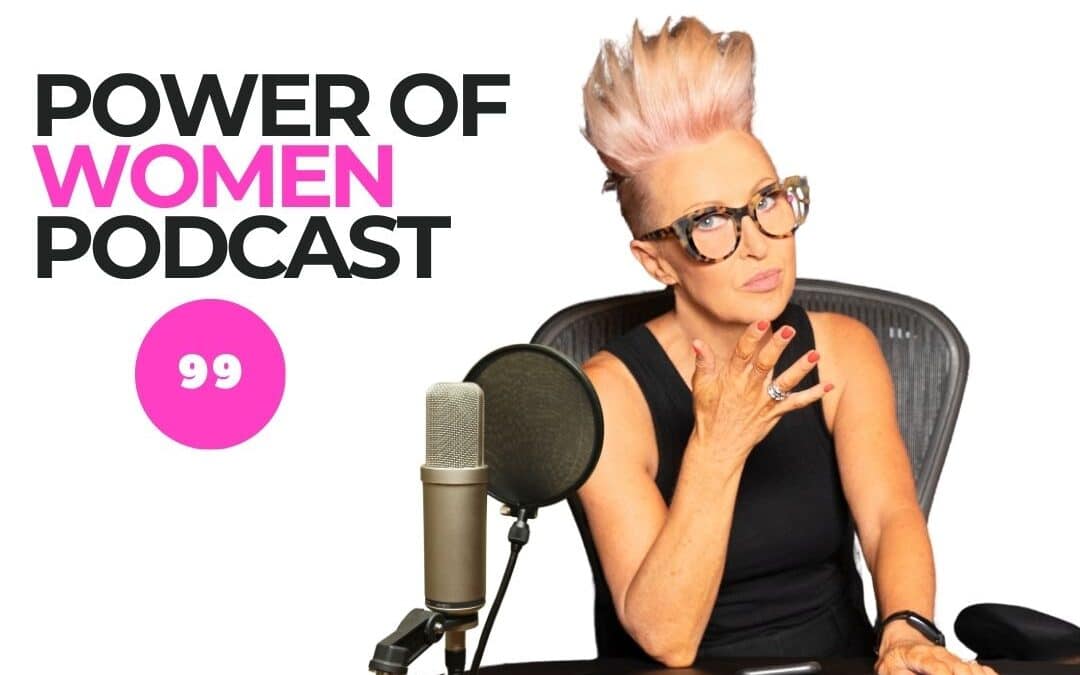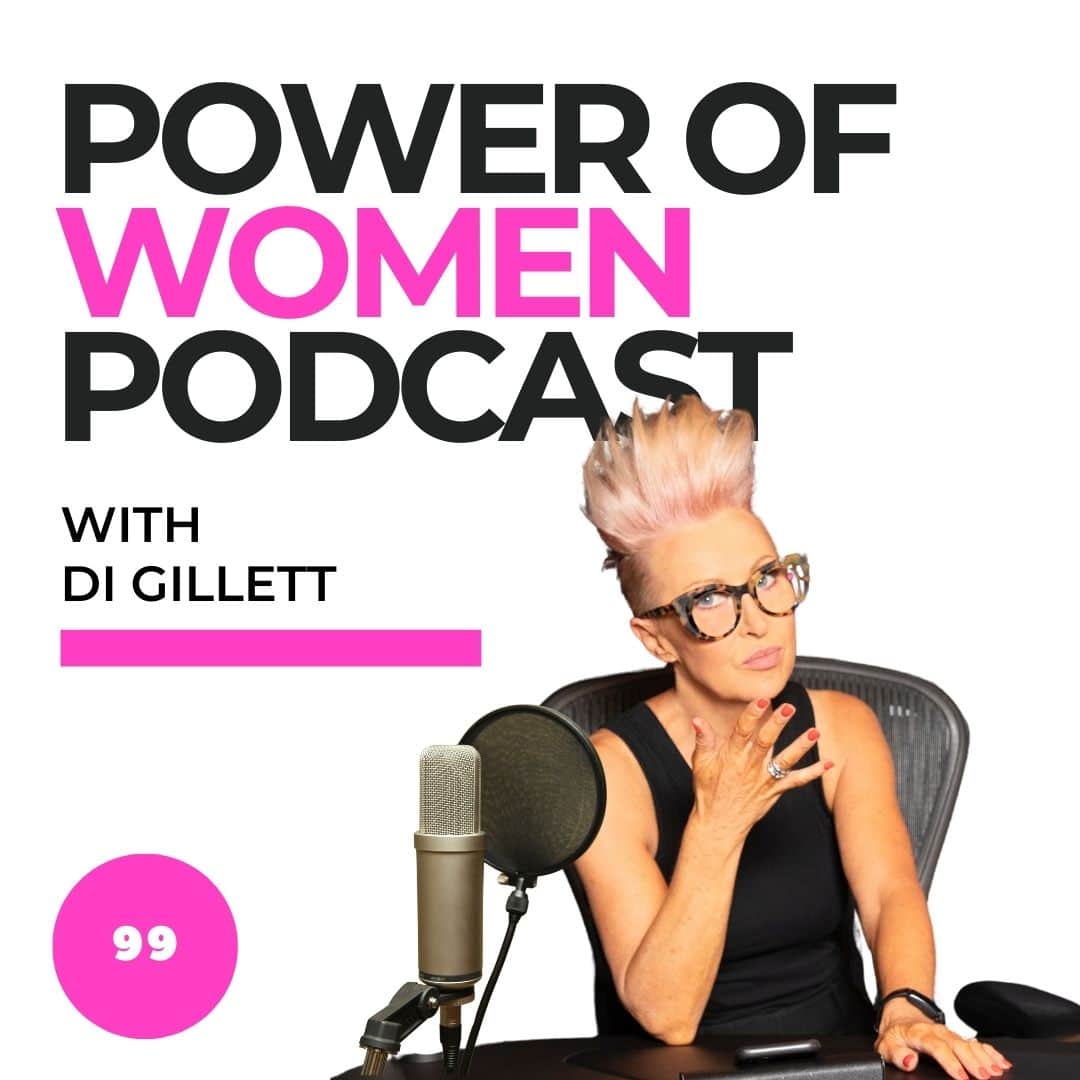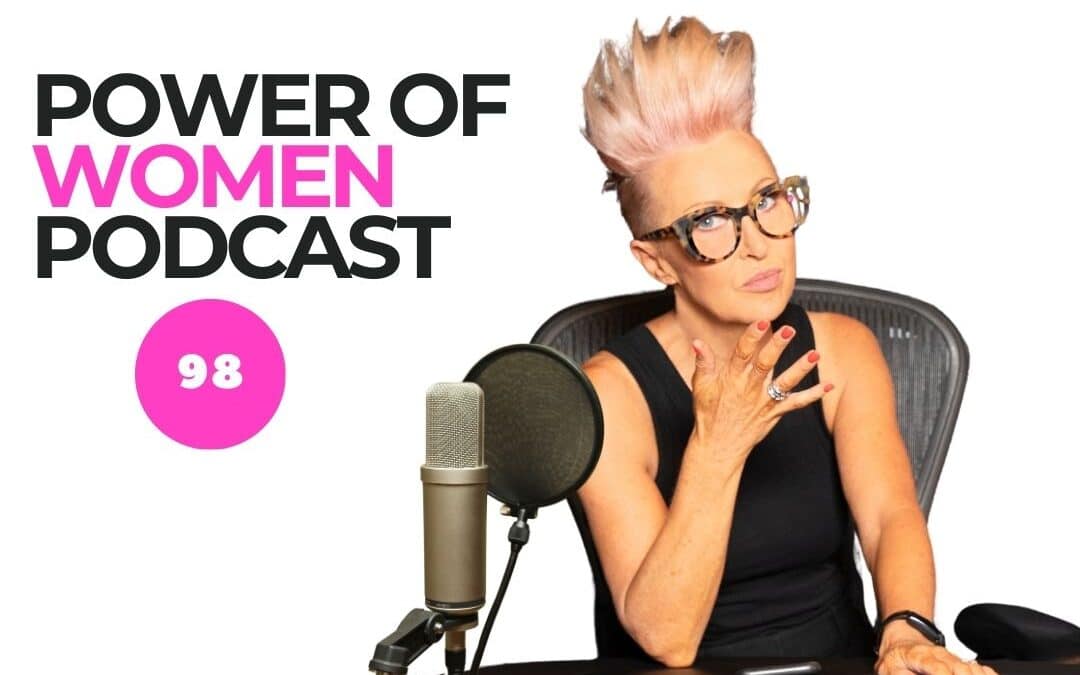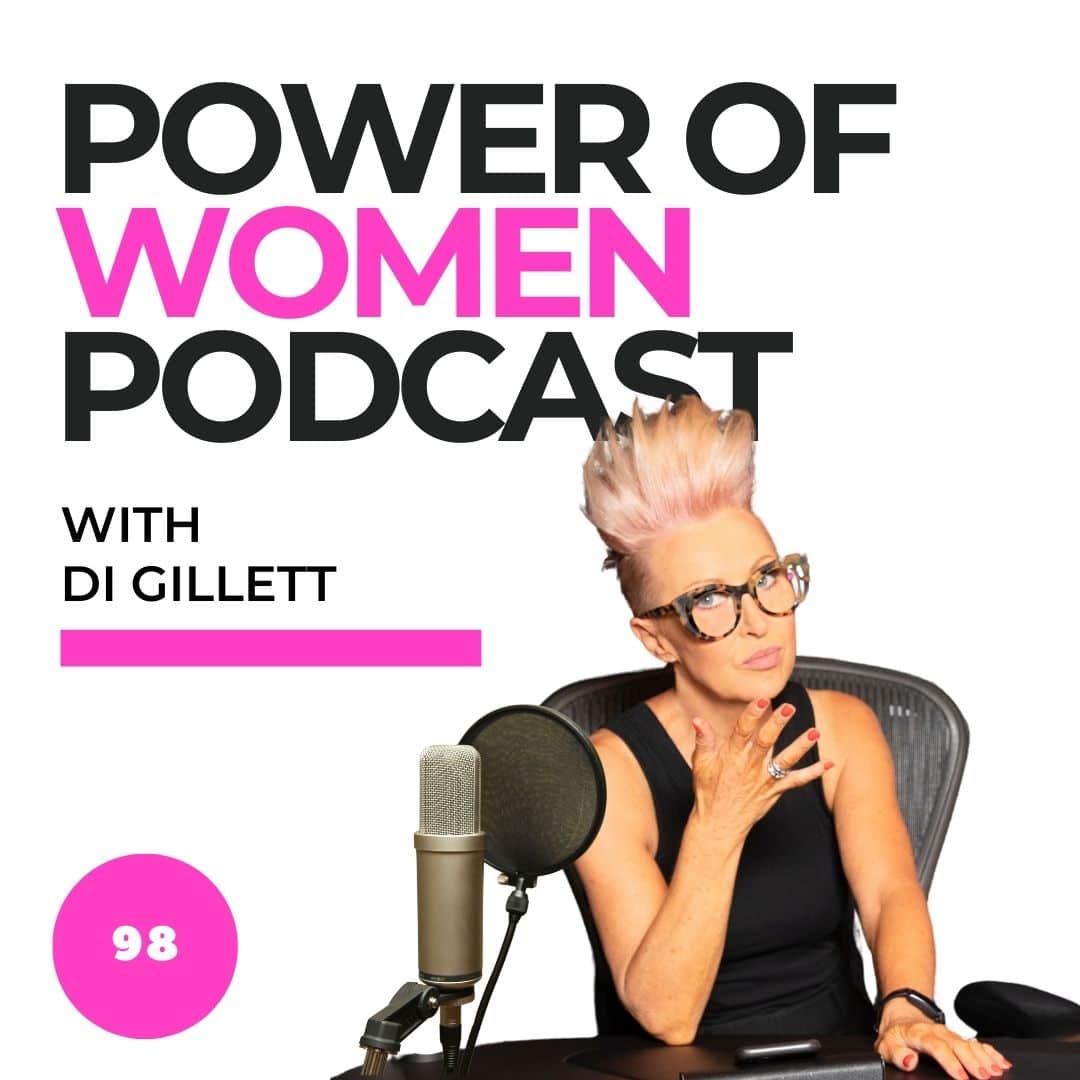FULL TRANSCRIPT:
TORY ARCHBOLD [Guest] (00:03)
And I had the opportunity to go and work in some of the biggest entertainment companies in the world in London on the working holiday visa. So I was exposed to George Lucas films, 20th Century Fox, MTV, Nickelodeon. Leaders listening right now lead through the power of your story. But don’t just put it there and go, ⁓ I launched Zara. That was such a long time ago, Di. People always ask me about it. But that’s not my story anymore.
DI GILLETT [Host] (00:29)
A moment that changed everything for you.
TORY ARCHBOLD [Guest] (00:32)
Mind Age Eth Experience.
DI GILLETT [Host] (00:34)
The most underrated skill for women in leadership. A belief you had to let go of to rise.
TORY ARCHBOLD [Guest] (00:37)
Self-belief.
People pleasing. You know, they were saying, but men judge us. I said, but you’re not putting yourself in the shoes of the men. Men also have stories. Men also have challenges and they feel that they’re going to be judged too.
So the top 1 % of female leaders around the world stand in their authentic truth. A happy heart is a magnet for miracles. Self-belief is your superpower.
DI GILLETT [Host] (01:12)
I’m Di Gillett and welcome to the Power Of Women Podcast. What I love about this platform is the opportunity to showcase and celebrate the strength, resilience and achievement of women from all walks of life. And that tapestry is getting richer as the community grows as we enter our third year. Can’t believe it. So join the conversation if you haven’t already.
Jump on to YouTube and subscribe to the channel there, or you can listen to us on any of the audible platforms. I am super excited though to start the new year with a very special guest. She hails from Sydney, but she is truly a global citizen these days, jumping between Riyadh, the US and Australia. She’s a woman whose name is synonymous with influence.
visibility, alignment and unapologetic leadership. But before I introduce her to you, let me ask you this. If you could change one thing in your life that stopped downplaying your voice and truly stepped into your power, what would that be? So every week I sit down with women who change the narrative in business, in leadership,
and in life. Women who don’t just rise, but more importantly, women who bring others along with them. And today’s guest is an exemplar of all of the aforementioned. Tory Archbold is the founder of Powerful Steps, a global platform activating the purpose, voice and leadership of high performing women across the globe.
She has built international brands, shaped cultural moments, and transformed the way women see themselves and their voice. And she does it in one unmistakable step of heart-led, high-impact truth. She’s a global strategist, a keynote speaker, and author of Self-Belief is Your Superpower, and the host of top-rating podcast, Powerful Stories.
Her mantra, lead with truth, partner with purpose, and build a legacy that outlives you. And today we’re going deep. We’re going to talk about how to elevate your voice, how to build networks that empower, and how to own your story with clarity, conviction, and alignment. Tory Archbold, welcome to the Power of Women podcast. ⁓
TORY ARCHBOLD [Guest] (04:01)
so grateful to be here and what a welcome. Thank you Di.
DI GILLETT [Host] (04:05)
It’s taken a while, Tory, and it is so good to have you in the studio. Could we kick off today with your story because your story is pretty rich in its own way. Can you take us to some of those early defining moments?
TORY ARCHBOLD [Guest] (04:22)
I love this question because everyone’s like, tell me your story, Tory.
DI GILLETT [Host] (04:30)
I’m sorry I didn’t quite get the string of that right.
TORY ARCHBOLD [Guest] (04:35)
So my story really started with rejection, if I’m completely honest with you, and a little bit of judgment thrown into the mix. So I like to say that I am a woman who jumped out of the box of expectations at a really young age and into a global world of opportunities.
DI GILLETT [Host] (04:43)
Mmm.
TORY ARCHBOLD [Guest] (04:59)
And I say that with my hand on my heart because I think when you reflect on the journey of who you are and where you come from, you really need to look at the highs, lows, and those game-changing moments. And one of the defining moments for me was when I started my first business, Tourstar, at 24 years of age. Very young. Very young. And I backed myself through self-belief. But also, I knew that I could ignite change.
And I wanted to create and build really powerful brands because, like many Australians, when you’re young in your early 20s, you’re schooled by the University of Life, not necessarily a degree, and you go and you explore the world. And I had the opportunity to go and work in some of the biggest entertainment companies in the world, in London, on the working holiday visa. So I was exposed to George Lucas films, 20th Century Fox, MTV, Nickelodeon, you know, the whole portfolio of Viacom.
And I fell in love with the power of storytelling. Absolutely loved it. And I thought, if there’s one thing that I can do that’s going to ignite change in this world, it’s going to be able to tap into the power of storytelling, but also take people on a journey. And I loved that. Like I was always an avid reader, you know, all the magazines, and I always loved the movies. But most importantly, I loved connecting with people.
And so when I came back to Australia, no one wanted to give me a job. Absolutely no one. I think that I was a little bit ahead of the times, but people didn’t recognize the depth of my knowledge and my capabilities. And I was actually okay with that because I always believe in life, you forge your own path. And so when it had coffee, because I couldn’t afford to take people lunch.
DI GILLETT [Host] (06:29)
You put that down too.
Of course.
TORY ARCHBOLD [Guest] (06:48)
And I always remember the advice like coffee not lunch because in those days coffee dates were $2 right? Yeah. It’s now some places in world. Yeah, $25 in some parts of the world to just buy someone a coffee but it was like a $2 exchange of energy and listening into what people needed and what I really recognized was that no one was tapping into what was happening on a global stage.
DI GILLETT [Host] (06:58)
be the price of lunch.
TORY ARCHBOLD [Guest] (07:14)
And I saw my laneway and I thought to myself, imagine if I could actually use the knowledge and the frameworks that I had been taught by what I would call wise souls who took me under their wing for those short stints in those incredible entertainment companies and actually transformed that into a business. And so I did. And it was called Tour Star. Started when I was 24. No money in the bank.
DI GILLETT [Host] (07:39)
Where does self-belief come from, Tory? Because that’s, you you say you come from, one of the words you said you come from is judgment. So how did you tap in and identify that self-belief so young?
TORY ARCHBOLD [Guest] (07:52)
So
the judgment came from rejection over when I went for coffee dates and it was actually an ex-boyfriend, so let’s get really serious here. Who ended up running one of the biggest advertising agencies in this region for quite some time. He was more of a hero and a legend in the industry, but he just couldn’t see what I could see at that point in time. And when I went for the coffee date and said,
DI GILLETT [Host] (08:02)
I had that rejection.
TORY ARCHBOLD [Guest] (08:17)
team I’ll never forget it was in Bills in Crown Street and I said look I think I’m going to start my own agency I’m going to call it Torstar and it’s going to be a branding communications agency and it is going to attract the world’s top performing brands celebrities and influencers and he kind of looked at me and wanted to put me back in the box that my parents had placed me and he’s like I think you should go and you know finish that interior design degree so that you can go and be a really good homemaker.
DI GILLETT [Host] (08:42)
We wanted to keep you small.
TORY ARCHBOLD [Guest] (08:45)
Absolutely and white picket fence and that’d be it but I’d already said no to that by going to London. Yeah. And so I remember walking out of that coffee date so clearly in Crown Street and kind of like putting my hand in the air as a bit of a fuck you. ⁓
DI GILLETT [Host] (08:59)
And thank you for the momentum.
TORY ARCHBOLD [Guest] (09:01)
Thank
you and thank you and I’m going to use that to actually drive forward my idea and so I did and no one in Australia would give me the opportunity to work with their brands because of course I didn’t have a track record and so I called a friend in London and I said to her look this is my idea this is the agency that I want to create what do you think and she said to her it’s brilliant I’m going to introduce you to someone who actually became my first client you always need a marquee client when you step out on your own
And my first client was launching Megan Gayle’s The Face of David Jones. And from there, I mean, it was all just based on referrals because I anchored every decision that I made in that business and my three values, passion, integrity, delivery. I had the intent to create and build powerful brands, but most importantly, I was the woman that delivered. And so if you deliver and you’re magnetic and you’re
years are so creative and outside of the box and anyone else’s, what’s going to happen? You’re going to attract. But also when you attract, how do you retain? So my clients on average stay with me for eight and a half, nine years, which is unheard
DI GILLETT [Host] (10:02)
Cool.
That’s
know even if I had the good fortune of holding on to a client for three or four years in the search space before somebody knocked you off your perch, you’ve done well. So that’s incredible.
TORY ARCHBOLD [Guest] (10:24)
And I do want talk about knocking people off your perch because I remember when I was pregnant with my daughter Isabella and I went to see a client and I saw that someone had basically looked at my website, looked at the clients I had because these were in the early days of, know, my gosh, you’ve got to have a website, how do you promote yourself because you usually used to go in and hand over a presentation presented. I’m about to give birth.
And another woman who had started an agency, I remember it was this one client, then I went to the next client, then the next client, and sitting on all of their desks was a presentation from her saying why she was better than me.
DI GILLETT [Host] (11:03)
and she saw your pregnancy as a moment of weakness.
TORY ARCHBOLD [Guest] (11:06)
Correct, but it actually was a moment of strength. What is that? Give it back, you know. All of the things.
DI GILLETT [Host] (11:14)
What is that in the world of sisterhood? Because that is very blatantly taking the decision to stamp on somebody’s parade.
TORY ARCHBOLD [Guest] (11:25)
It absolutely is and that same woman used to come up as a plus one to my events with the media and hand out her business cards at my events. I mean, I looked at that situation, I thought, okay, she wants what I have. Yeah.
DI GILLETT [Host] (11:40)
So she’s already on the back foot she’s chasing?
TORY ARCHBOLD [Guest] (11:43)
She wants what I have, but she’s not me. And for anyone listening to these podcasts, always remember, like, you are unique. You have a unique footprint. She can’t be me. And it didn’t dampen what was a stellar career. And I ended up attracting the best of the best.
DI GILLETT [Host] (12:03)
And I love that you say that because there were a few critics when I first decided to call my podcast Power of Women because I had actually secured the domain name Power of Women 10 years earlier with an idea that I was going to build some purpose-led female platform. And I said, well, that’s true. If I Google Power of Women, there’s a few in the marketplace, not as many as you might think.
But there’s only one power of women with diagelate.
TORY ARCHBOLD [Guest] (12:34)
Correct. And you are the star of the show. You are the leader of your own destiny. And you know, as Oprah said, I saw her in Sydney last night. She said, lead yourself. Lead yourself. Rise up as yourself. And so I’ve always lived by that motto as well. And I was an Oprah fan, you know, I’m sure you were as well. We were young. She leans into the heart, not ego.
DI GILLETT [Host] (12:45)
Mmmmm ⁓
Absolutely.
Yeah.
TORY ARCHBOLD [Guest] (13:02)
And so I think that if you believe in an idea and you believe that you can step into it, that’s your intent, that’s your purpose. All you need to do is anchor it back to your values and it’s the ripple effect.
DI GILLETT [Host] (13:13)
With Torstar, it was incredibly successful, but you walked away after what was it, 20 years. not because the business was on a downward trajectory. You walked away at the top of its power. What led to that?
TORY ARCHBOLD [Guest] (13:30)
my intuition. The secret whispers of life. ⁓
DI GILLETT [Host] (13:35)
⁓
One of my favourite things that so many women don’t acknowledge or listen to.
TORY ARCHBOLD [Guest] (13:42)
the secret whispers of life. So I knew that I had a story that I wasn’t telling. And while I was really good at creating and building brands and obviously telling the stories of global businesses, but also CEOs, board directors, founders, like the best of the best, I like to call them the top 1%, at the same time I wasn’t being honest about who I was. And so there was this niggly feeling inside of me,
And I remember it actually came from the movie, Hard Loser Guy in 10 Days.
DI GILLETT [Host] (14:17)
As distinct to my pretty woman experience in Sydney only recently of not being allowed into a luxury boutique. See, we’ve all got a movie.
TORY ARCHBOLD [Guest] (14:24)
We’ve all got a baby. So my daughter and I, Bella, we’re in LA and I had just won the keys to freedom through standing up and winning full custody in a non-contact order in the Federal Circuit Court of Australia. So I think I’m one of three percent of women that self represent and actually successful, successful in the sense that it was 12 years. It almost broke me.
But I came through that tunnel and saw the light and was completely happy. And my daughter was young at the age and we’d been watching on repeat this Matthew McConaughey movie. And I said to I think it’s ready, well it’s time for me to start dating. But I only had five days free in my diary.
DI GILLETT [Host] (15:08)
And was Matthew your pin-up of what you wanted do? he wasn’t! Because he would have been mine!
He actually wasn’t! have been mine!
TORY ARCHBOLD [Guest] (15:15)
Before we were due to hop on a flight back to Sydney from LA, we actually bumped into him in the park. Like this is like serendipity, the way this all turns out. And it was all about my daughter saying, Mom, I want a picture with Matthew. And I said, well, that’s not what you really do, because I work with a lot of people like that. If you never take photos with them, it was my golden rule. And ⁓ she said, well, can you ask him? Can you ask him? And I felt so uncomfortable. So I asked him and he said, no.
Sorry, no. And then we kind of, no, he was just like, no, photos, no photos. But then do you know what the crazy thing was? Then this paparazzi guy comes along and takes his photos. And I looked back and I was like, you’re saying no to like my daughter is under 10 and yes to the paparazzi. And then of course it was like Matthew McConnachie on Venice beach working out. And I thought that’s, that was the reason. And I was okay with that. But anyway, we actually decided to use that for fuel to the fire.
DI GILLETT [Host] (15:47)
A southern drool?
TORY ARCHBOLD [Guest] (16:14)
And when I came back to Australia, I was on Bumble and I decided that I was going to date six guys in five days and learn about myself die. And I learned more about myself from dating five different guys than I did in a lifetime. And so I started to understand the power of is tour style what I really want?
Do I really want to be around all of these so-called celebrities and power brokers who sometimes aren’t showing the heart and the empathy and they can disappoint us? And what if I actually dug deep and looked at what my story was and how that can help other people? Now, ironically, Matthew went on to do Greenlights and it’s a book I absolutely love.
DI GILLETT [Host] (16:48)
And they can disappoint you.
TORY ARCHBOLD [Guest] (17:05)
And I do think that that moment in time where our paths crossed, it was maybe not a great time for him. And I was actually coming out of the tunnel into the light. So I was stepping up into what he is. Ultimately, he’s done so much for so many people by sharing the power of his story. But I look at that time and I think to myself, who have I not worked with? What are the things that I want to wrap up? What am I going to do with the 22 staff that I have? How are we going to pay forward my…
DI GILLETT [Host] (17:11)
Yeah
TORY ARCHBOLD [Guest] (17:33)
knowledge and what’s the legacy piece going to look like. It wasn’t TORSTAR and I was 44 years old and I shut the doors. I had an offer on the table to sell and I said no to the money and yes to myself. Best decision of my life.
DI GILLETT [Host] (17:36)
and it wasn’t tossed.
Because selling meant you had to go with it. And cuffed.
TORY ARCHBOLD [Guest] (17:51)
Handcuffs?
And I don’t like handcuffs. I like creating and delivering impact.
DI GILLETT [Host] (17:55)
Everyone
And neither does our audience.
TORY ARCHBOLD [Guest] (18:00)
Through the heart, not the ego. And, you know, my last three clients were Drew Barrymore, Steve Madden, and Victoria’s Secret, three of the top brands out of the US. But they each taught me something about myself to give me the confidence to walk away because I was no longer afraid of judgment.
DI GILLETT [Host] (18:21)
Yeah, you got there at 44. I think I said to my husband earlier that day, and I did have a guest on the show last year who said she was a late bloomer. And I actually think I’m a late bloomer too. I’m now early 60s, but I think I really stepped into who I am visually, emotionally.
in every respect when I hit 50.
TORY ARCHBOLD [Guest] (18:54)
I mentor so many incredible women and right now I’m mentoring a beautiful lady who’s about to turn 70. And she’s worked with every major star you can think of in Hollywood. And she’s looking at me as her mentor to show her what does her legacy piece look like.
DI GILLETT [Host] (19:14)
because she’s done it for others and she’s done nothing for others. I remember that lesson, Tory. You mentioned something not dissimilar to me.
TORY ARCHBOLD [Guest] (19:16)
nothing for herself so she’s gone back to her
Yeah.
Tap into the power of your story and who would have known that it had a naked chairman. You know, your story, there were all of these twists and turns to who you are as a woman. And one of the gifts of LinkedIn for me is connecting with women like you, who now have the confidence to share their story. Because now when you look at who you’re interviewing, you look at the caliber, you look at the vibration.
DI GILLETT [Host] (19:47)
Absolutely.
TORY ARCHBOLD [Guest] (19:48)
It’s
because you actually stood in your power and owned it. Because when we first met, you didn’t own it. You didn’t.
DI GILLETT [Host] (19:56)
I
was giving it away. I had it, but I actually think I was giving it away. were. I don’t know whether that’s generosity or stupidity, but I’m not going to ask you to answer that. It’s It was a decision.
TORY ARCHBOLD [Guest] (20:01)
But now you’re owning it.
Yeah, it’s generosity. But I know since we have that time together and watching your journey now and the impact that you create, it’s extraordinary. And you are one of those top 1 % women that I talk about because you’re in alignment, your soul’s happy, your heart’s happy. Absolutely. And your voice means something to other people. And that’s what we call the ripple effect. That’s the legacy of who we are as women.
DI GILLETT [Host] (20:40)
But does it still surprise you, because I know it still surprises me with some of the feedback that comes back of thanking you for sharing and putting it out there. That still feels very new and unfamiliar to me. Does that dissipate or change with time or is that revelation a revelation every time?
TORY ARCHBOLD [Guest] (21:02)
It just makes me happy. It makes me so happy that you can crack open the hearts of female leaders. And that when you meet them, and then when you see them a few years later, I mean, last night after Oprah, I had so many women I hadn’t seen that I mentored through COVID, even from regional Australia, coming up and hugging me and saying, Tory, you’ve changed my life. And I always say, no, you just called me. And all you did.
was follow the frameworks and you did the work, which is why you are there. But I always say, thank you, you know, thank you for acknowledging that, but it was actually you.
DI GILLETT [Host] (21:41)
Mm. Mm. I love that. Now, you have a book, Self-Belief is Your Superpower, that you released some time ago. I believe you’re working on a new book. Can you tell us anything about it?
TORY ARCHBOLD [Guest] (21:53)
I am.
My legacy, my way. Because, Di, I feel that when we get to the halfway mark of our lives, like so many of the listeners as well, we’re looking at how can we give back? How can what we’ve been taught or we’ve learned along the highway of life apply to the next generation? Or how can we actually give others the confidence to navigate challenging situations? And so when I teach others, I also teach myself.
DI GILLETT [Host] (21:58)
I love it.
Mmm.
TORY ARCHBOLD [Guest] (22:24)
And I realized that this year that there was a big milestone in my life when my father died. And I was estranged for many, many years from him, not because I didn’t love him, but because our values didn’t align. And integrity is one of them. Integrity is really important to me. And he knows the reason why I walked away. And he asked for forgiveness in front of my daughter, which was a really big healing moment for me.
And so when he passed and I did a post on Instagram saying that, you know, this is why he was in my life for some time, but this is what I’ve learned from it, everyone started commenting and they jumped in and I had a phone call from the CEO of the time of Hello Sunshine when I was in West Hollywood hosting an event a couple of weeks later for Powerful Steps. And she said to me, Tory, that’s what we call the ripple effect.
DI GILLETT [Host] (23:04)
jumped in.
TORY ARCHBOLD [Guest] (23:20)
Honesty from women is such a rare thing and I’d met her a few years beforehand.
DI GILLETT [Host] (23:26)
extraordinary. Honesty from women. What’s the decision to hold back?
TORY ARCHBOLD [Guest] (23:32)
They’re afraid of the truth. They’re afraid of what people will think of them. It’s a judgment piece that we spoke about. And she knew the back end of my story of how I’d won full custody, how I’d created this business, how I’d attracted all of these brands. And she said to me, you know, that story is pretty extraordinary. She said, but I think you’ve got another story. Tory. And I said, ⁓ I think I do. And she said, I think it’s time to tell it.
And I was going to Saudi Arabia, my husband’s based in Riyadh, I now live there with him. And she said, I want you to go to the desert and ride it. And so I’m about to wrap it up. And yeah, my story will go into film and a whole lot of vertical. I’m very excited.
DI GILLETT [Host] (24:15)
Very exciting.
Brilliant. I look forward to being at the launch, could be in Riyadh ⁓
TORY ARCHBOLD [Guest] (24:25)
all around the world. It’s manifested.
DI GILLETT [Host] (24:28)
There we go. I will clear my diary. Now, Forbes wrote, she leads with heart and healing what corporate women crave right now. What do you think corporate women are missing? Because there’s a lot of leadership issues going on in the marketplace and there’s a lot of business women who listen to this podcast.
TORY ARCHBOLD [Guest] (24:52)
Women are afraid of standing in their truth when they’re in corporates for fear of judgment, fear of not getting that promotion, fear of what their team will think, fear of if they actually think someone discovers something about them that doesn’t align with company values. But actually it’s the opposite. It is the complete opposite because I explained this when I was doing the opening keynote for the Salesforce Female Lead Program the other day in Sydney.
And, you know, they were saying, but men judge us. I said, but you’re not putting yourself in the shoes of the men. Men also have stories. Men also have challenges and they feel that they’re going to be judged too. So if you strip it all back and you’re honest with each other, imagine the magic you can create. One of my biggest posts on Instagram, it went viral. It’s sitting at about 80,000 organic views right now. And it’s me crying.
And it’s me finding out that my dad’s ashes had been left at the crematorium. After four and a half months, my sisters had left him there. After they uninvited me to a funeral, we might…
But I give this as an example because my intuition at the time was like video this moment when the New South Wales government on compassionate grounds gave me access to 1,030 medical documents so that I could actually access the truth of what happened. And so when I found out, it wasn’t because my sisters told me how my dad passed, it wasn’t that the executives of the will told me how my dad passed even though I was next of kin.
It was through the kindness of this incredible man ⁓ from the New South Wales government and I just watched myself just film this moment. It was just like my intuition saying it and I was spot on and I’m sharing this because it’s related to corporate women in Australia. That did not change corporate women or corporate businesses booking me into the next year for keynotes around the world.
DI GILLETT [Host] (26:54)
Mmm.
how they.
Because it wasn’t seen as weakness.
TORY ARCHBOLD [Guest] (27:07)
It wasn’t a weakness, it was a strength because I was in my authentic truth and I was distressed. I was crying. But I’ve actually pinned that to the top of my Instagram because I think it’s a powerful reminder to any female leader anywhere in the world that the raw and authentic moments are the most powerful. Gone are the glossy days when you turn up with the airbrushing, which you and I have both done.
because of course that we you know we grew up in magazine media and you know all of those things
DI GILLETT [Host] (27:41)
The
real power is in vulnerabilities.
TORY ARCHBOLD [Guest] (27:44)
want it. And then on LinkedIn, you know, I might be in different parts of the world and saying I’m going on a coffee date and people would be like, but Tory, you’re wearing your workout gear. I’m like, so what? Some of the most powerful coffee dates in my life have been with women like Shelly’s Alice, who created the female quotient and who through acts of kindness and coffee dates says to me, Tory, we can create magic together.
DI GILLETT [Host] (28:10)
and you’re in your gym gear.
TORY ARCHBOLD [Guest] (28:12)
And so is she. And she’s like, Tory, help yourself to coffee in my house and I’m going to fly to Australia and I’m going to see what you’ve created with Powerful Steps. Now, she wasn’t judging me on what I wore. She wasn’t judging me that my skin might have been a little bit blotchy. So for corporate women who are struggling right now, don’t be afraid to share those moments because every strong woman in the world has those moments.
DI GILLETT [Host] (28:38)
We’ve come a long way from the 1980s power suit. Thank God for that. ⁓
TORY ARCHBOLD [Guest] (28:44)
Mine were all given away.
DI GILLETT [Host] (28:48)
Well, coming up, we’re going to shift gears into two big themes that every woman in leadership needs right now. Firstly, how to elevate your voice and how to build networks that empower. Back soon.
If you’re loving the Power of Women podcasts, be sure to jump onto our YouTube channel and hit that subscribe button to ensure you never miss an episode.
So you’re listening to the Power of Women podcast and if you’re enjoying the show, jump on and follow us on any of the podcast platforms. I’m joined today by Tory Archbold, brand builder, cultural activist and powerful advocate for women owning their voice. Tory, when a woman says, I want my voice to be heard, what’s the step to do that?
TORY ARCHBOLD [Guest] (29:43)
The first step is getting out of your own way. It’s like, get out of your own way. Well, I knew you had such an incredible story, but it was getting it in writing. So when you own your story, you own your power. It’s pretty simple. But most women don’t hit pause and they don’t give back to themselves to truly know the power of their story.
DI GILLETT [Host] (29:46)
There you go. think that’s what you said to me.
TORY ARCHBOLD [Guest] (30:08)
So the ones that actually hit pause, invest the time in getting to know themselves, right from the start, are the ones that are the high vibrational women that can walk into any room anywhere around the world and people will say yes.
DI GILLETT [Host] (30:23)
That’s a really interesting point and I know I came out of a de facto relationships a couple of years before I met my husband 20 years ago. And I had to really stop and that was the first time I truly paused because I’d gone from one average relationship to another and it was like, just a second, what’s wrong? Because I don’t think there’s anything wrong with me. There’s something wrong with what I’m doing.
And of two years of purposely staying single, I recognised that I had allowed men to choose me rather than me to do the choosing. And that was the turning point. And it was early 40s actually. So I say I didn’t step into my parents until I was 50, but I didn’t get to know myself until I was 40, which then gave me the foundations to step up.
TORY ARCHBOLD [Guest] (31:21)
Jitko Queen, I am with you.
DI GILLETT [Host] (31:24)
There you go. You
too got married later in life like I did.
TORY ARCHBOLD [Guest] (31:28)
Yeah,
46 for the first time.
DI GILLETT [Host] (31:31)
and I was 41. Yeah. Highly recommend holding off.
TORY ARCHBOLD [Guest] (31:34)
I know. And just, you know, about telling your story. I remember when I had a copywriter when I was first starting Powerful Steps and she said, Tory, you need to do your bio. And she actually put in it that Drew Barrymore ended my career. And I thought, oh my gosh, I can’t say that, but it was actually true. But in a good way. When he clicked on it, it was a good way. But she also said in there, and I got married for the first time at 46. And I said, why are you putting that in there?
And she said, you watch the women will slide into your DMS and you’ll build a business. And I thought no one commented, but we did talk about corporate women and being afraid of the truth. And my DMS were jam packed with women saying, I can’t believe that you got married for the first time at 46. How is that possible? And if you actually
DI GILLETT [Host] (32:27)
wasn’t a criticism.
TORY ARCHBOLD [Guest] (32:28)
It wasn’t. was like, how did you meet your match? So it actually opened up a whole lot of other conversations. And if you Google my name now, normally one of the top three things that come up is Tory Archibald’s husband. People are desperate to know like, who’s the husband? but my husband’s name is Craig. And he’s my soulmate.
DI GILLETT [Host] (32:39)
at 46.
Isn’t that interesting? That’s how you take control of the narrative.
I love you.
TORY ARCHBOLD [Guest] (32:56)
And hopefully we have this happily ever after scenario like you and George.
DI GILLETT [Host] (33:01)
Well, I think so because we’ve done the work before we embarked on them. So how does a woman begin to own her story in a way that’s, and importantly, because there’s so much ⁓ unauthentic information out there. mean, think social media is allowed for it. How does she do it in a safe and authentic manner?
TORY ARCHBOLD [Guest] (33:26)
She actually clears her diary and she says to herself, I’m going to open a Google Doc. I’m going to follow Tory’s five-point story framework. And it’s really simple. So you are writing your own hero’s journey. Yeah. So point one of your story when you’re writing is like, who are you? What kind of a family did you grow up in? What were the dynamics? Where were you living? What are your core memories? The second part is, well,
DI GILLETT [Host] (33:43)
Mmm.
TORY ARCHBOLD [Guest] (33:56)
When you left school, what did you want to become? So I always talk, you know, in interviews or when I’m coaching people now, and I said it in this interview as well, everyone wanted to box me. And I jumped out of the box and I went to London and I worked with the world’s best entertainment companies. But then in part three of your story is how you’re using that to step into your success story. So your success story is always, you know, what are three things that you became so brilliant at that nobody can take away from you?
But give me some facts. Give me some juice. So I always talk about the fact that, you know, Zara, I launched Zara into Australia. 22,000 people, a million dollars on, you know, the day of launch. But it wasn’t about me, it was about the collective team, right? So when I’m writing in the story, I give examples like that. Then it’s always success with a little bit of survival. So what people don’t realize about me, and when you’re thinking about writing your own story,
is well, what did you survive when you’re at the top of your game? Because everyone had a child. Yeah, your naked chairman. So mine was an ex-partner like the father of my child where I was stalked, harassed and intimidated for up to 100 touch points a day. I was one of the first women in New South Wales to get an AVO around people that actually target you online. And so when you look at all of these things, no one knew that part of my story because
DI GILLETT [Host] (34:59)
And that’s my naked chairman.
TORY ARCHBOLD [Guest] (35:25)
part four of my story, is a game-changing moment, which I like to call like the fuck you from the universe. So when you’re writing it, it’s like, well, what is it? You had burnout, I had burnout, I had a near-death experience. And so, you know, 72 hours before I was due on a flight to London to host some global media, my appendix burst. I ended up with septicemia. I lost eight kilos in five days. I had 12 rounds of antibiotics.
and I did not get better until that surgeon said to me, Tory, you don’t know how to be happy. I said, what do you mean? What is happiness? And he handed me a piece of paper and on it was a happy heart as a magnet for miracles. So when I’m writing a magnet, he handed that to me. And it’s now because I share it with everyone.
DI GILLETT [Host] (36:04)
We it.
I know it’s a phrase you use but it was given to you.
TORY ARCHBOLD [Guest] (36:12)
from the surgeon who saved my life. And it’s also helped thousands of women around the world because I share it willingly. in that Google Doc, when you’re writing a story, think about those moments. Who helped you navigate them? I also recognise in point four of my story that I was an ultimate people pleaser. And also, was surrounded by takers who did not believe in a mutual exchange of energy. So if I was going to get better, if I was going to get that happy heart, what was I going to strip out of my life?
to it into alignment, to listen to my gut instinct, to shut my business, to say no to the multi-million dollar offers to buy my tour star, and to actually go, well, I deserve love. So part five of my story was fast-tracked really quickly. I found my soulmate, thanks to Matthew McConaughey.
DI GILLETT [Host] (37:00)
And it wasn’t Matthew McConaughey.
TORY ARCHBOLD [Guest] (37:02)
What’s
it? What husband’s name’s Craig? And I shut my business and I stepped into my power. So how do people own their story? It’s taking the time to do that, but your story’s not over once you’ve written it. So I know my story really well. I’m able to articulate it in business, in social settings, on coffee dates, everywhere. And I’m so crystal clear and I’m known for certain things.
Like storytelling, yeah? Coffee dating. I’m also known for my survival story. There are so many parts to it, but I know it inside out, which makes me a brilliant leader. Because I can meet anyone and I can see what is going to touch their heart and their soul and take them to the next level, because it’s likely I might have experienced something because I’m tapping into my story that relates to them.
Now a couple of weeks ago I went back to a place called Kamalea in Thailand, Koh Samui, and it was actually a place that I’ve now been to nine times. And believe it or not, I’m coached by this amazing Buddhist monk called Sujay. And he is, I mean, he has my heart on so many levels. And during the two weeks that I was there working on my book and what I’m going to do with my story writes,
I actually went back to my five point story framework because my story’s not over.
DI GILLETT [Host] (38:27)
must agree that because this is being augmented all the time.
TORY ARCHBOLD [Guest] (38:32)
So leaders listening right now, lead through the power of your story. But don’t just put it there and go, I launched Sara. That was such a long time ago, Di. People always ask me about it. But that’s not my story anymore. My story is like who we are here. so don’t forget that you walking, talking encyclopedia, who is a female leader.
DI GILLETT [Host] (38:53)
So keep writing.
TORY ARCHBOLD [Guest] (38:58)
who can create and deliver impact around the world, but you can never do that if you don’t own the power of who you are.
DI GILLETT [Host] (39:05)
I was asked the other day how people would describe me when they first meet me and potentially it’s aloof or distant. And there is something in, and I suggest even in your own story with Tour Star, you were successful and people put you at a distance on a pedestal unattainable. But once you started to share your story, you’ve humanised
the individual and now people want to engage and reach out. And ⁓ I’m finding that in releasing these drip feeds in my story and there’s much more to come. Not all of it’s probably fit for publishing, but there’s a lot more to come. But in humanising the name and revealing something about yourself, people want to engage because you’ve humanised the brand.
TORY ARCHBOLD [Guest] (40:00)
Of
course. I’ll give you a really good example. When I had that near-death experience back in 2013, there was only one photo of me that was actually taken by an ex-boyfriend at the time. And his dad actually saved my life before I got to the hospital. So I will always be very grateful for that. But I never wanted to share that picture. And so…
many media publications when I started sharing the power of my story would say to me, you have a photo? And I’d say, no, I don’t have one.
DI GILLETT [Host] (40:31)
Knowing full well that you did.
TORY ARCHBOLD [Guest] (40:33)
I had a double chin in the photo. I thought to myself, and I was like carrying extra weight, which actually, by the way, saved my life because losing eight kilos in days. I needed the fat, right? So I look at it all now and I can see why ⁓ that was a positive. But I just thought I can’t share a photo of me with a double chin. Then when I was going through what was happening with My Legacy My Way and the family dynamics that came after my father died, when I was actually given permission,
DI GILLETT [Host] (40:43)
something in
TORY ARCHBOLD [Guest] (41:03)
to actually share the truth of my background and my story, which will obviously come out next year, I thought to myself, Tory, honestly, get out of your own way. Who cares that you have a double chin? And so I decided to post it on LinkedIn. And it’s now had almost 60,000 impressions. There’s over 270 women and men from around the world actually sharing their own stories of burnout.
But what I did with that story, and I think this is really important when you do share parts of your story that are real and raw, you have to be authentic. So I said I didn’t want to post this because I had a double chin. Now in the comments, people are like, but I love your double chin and I’ve got a double chin and this is what happened to me. I thought this is earlier. But I also, when you share a personal story, I always include three
DI GILLETT [Host] (41:52)
My tonight party!
TORY ARCHBOLD [Guest] (42:01)
leadership lessons. So I said, what you may not know is at the time I had this top agency, these were my clients, these were the brands, these were the results that I was living and breathing and investing all my time in. I was also a single mom in the family law court system. And I was really in the battle of my life. So I was going back to that five point story and I was setting up the hero’s journey
so that it would actually land in people’s hearts so that they could actually take affirmative action. That’s what leaders do, right? But then the three takeaways I said, and what you may not know is while I was lying in this hospital bed in the ICU afterwards, is that three men did these three separate things to me. Number one, my data access, my financial records without my permission, which is illegal in Australia.
Number two, the man who saved my life asked me for $6,000 to pay off his credit card. And number three, the father of my child sent me a text saying, I thought I’d see you’re a bit sure in the city morning, Harold. So I am at my most vulnerable. The battle of my life and these three men kept going and no one knew. So when you’re giving your story to the world,
DI GILLETT [Host] (43:07)
And they can’t go.
TORY ARCHBOLD [Guest] (43:20)
Give it with intent. And my intent was to show, sure, I’ve worked with all of these incredible people around the world, but I’m human just like you.
DI GILLETT [Host] (43:29)
And shit has happened. Shit.
TORY ARCHBOLD [Guest] (43:31)
has gone down. But guess what? Through that shit has come the greatest gifts of my life. And when I look at those three men, actually said in that post, thank them.
That was like I thanked them and I still am grateful for them doing what they did because I would not be here today on your podcast if they didn’t.
DI GILLETT [Host] (43:53)
And that is a little like my story, Tory, with the alopecia journey where I lost all my hair and the cruelness of, ⁓ and I referenced it in some of my storytelling of my then line manager, when on the one day I rang in and said, I can’t do this because I looked, I felt like I looked like a freak show with a few strands of hair left. And instead of saying, take the time you need, he said, why?
Aren’t you coping? Which nearly drove me off the edge. But it was the absolute anger out of not letting somebody else define where I was at that I pulled myself back and found some purpose in the whole thing, similarly. And isn’t it interesting what nearly kills us makes us stronger literally.
TORY ARCHBOLD [Guest] (44:26)
Of course.
does. Literally. want to share what Sujay said to me a couple of weeks ago because I was coaching a few women in a group the other day and I remember Sujay saying to me with everything that I’d been through this year, I was still showing up on LinkedIn. So the first thing he said to me is, he said, we’ve all been following your journey and we’re so inspired. And I said, thank you. But why? And he said, you always show up. And I said, but Sujay, this is what’s really happening behind the scenes.
And he said, oh my gosh. And he’s known me for a very long time and helped me through some of the darkest times of my life. And he started by saying what I’d been through was a nine out of 10. And when we finished, it was a 9.75 out of 10. And I thought, oh my gosh, but what is the key learning here? And he said, Tory, you need to learn to get angry. And I said, I’m not angry. I’m disappointed. I’m disappointed that humans behave like this.
And then a couple of days later, something came through where I had to prove my value.
DI GILLETT [Host] (45:49)
you stop for a second? A Buddhist monk saying you need to get angry. Now, because they probably normally say to me you need to temper the anger.
TORY ARCHBOLD [Guest] (45:54)
I’ll explain.
Yeah, no. He said to me, ⁓ anger is confidence and confidence is going to fuel the legacy that is going to transform your story into helping millions of people, Tory, and I you to get angry. ⁓
DI GILLETT [Host] (46:13)
I just kept saying to you, I’m disappointed.
TORY ARCHBOLD [Guest] (46:15)
But
then something came through where I was asked to prove my value of something that I contributed hundreds of thousands of dollars to. made me angry because I thought, how am I supposed to explain that this is my contribution? is just not okay with me. And I went back in and I sat on his chair and I said, I’m angry. And he said,
DI GILLETT [Host] (46:26)
make you angry?
She can’t
Hallelujah
TORY ARCHBOLD [Guest] (46:44)
Yeah,
he said, good. He said that is the confidence that is going to carry you forward. ⁓ Anger is confidence.
DI GILLETT [Host] (46:53)
How do women build networks that empower them and know that they’re in a safe space and who they’re surrounded by?
TORY ARCHBOLD [Guest] (47:01)
So number one, you’ve got to go back to your story, which is what we’ve just talked about. Because why would people connect with you if they don’t know who you are? How are they going to know that your values are aligned? How are they going to know that what you’ve experienced in business or life is a match for where they’re at? Because networking is about a mutual exchange of energy. It’s not about, ⁓ I want you to do this for me, but I’m not going to give you anything in return.
DI GILLETT [Host] (47:25)
And we’ve all experienced those people, we still do.
TORY ARCHBOLD [Guest] (47:28)
Correct, it’s not life, it’s not life. networking for me started with that $2 coffee date philosophy. And I’ve been doing this for 25 years now.
DI GILLETT [Host] (47:38)
5
euro in Paris, but that’s okay.
TORY ARCHBOLD [Guest] (47:40)
It’s okay, that’s wild, right? Wait until you come to Riyadh and visit us, the Evian is $40. $40 in a nice restaurant for Evian Water, because it’s like their wine. So here you go. But going back to networking, at a young age, I recognized the value of helping others without asking for anything in exchange. And so all my life, I’ve had three coffee dates a week.
DI GILLETT [Host] (47:48)
He
⁓ my god.
TORY ARCHBOLD [Guest] (48:10)
One with someone I know, one with someone I want to partner with, and one with someone completely outside my comfort zone, which is how I’ve landed the biggest opportunities of my life. Because what I’m doing is I’m placing my energy, my story, and what I can give to others, asking nothing in return into the energy and the aura of others. It’s magnetic. It is magnetic. And so it’s very rare that I get ghosted.
DI GILLETT [Host] (48:29)
But it’s a very clever BD strike.
Mm-hmm.
TORY ARCHBOLD [Guest] (48:41)
The last person that ghosted me was my sister. It wasn’t a business person. She ghosted me when I’m like, how did our father die? Refused to tell me. Still to this day, refused to tell me. So I’m okay being ghosted by people like that. It doesn’t bother me. ⁓ But I also think that when you understand the power of your story, you can connect with anyone in the world. You can walk into any room anywhere in the world and people will say yes. And I will tell you this one thing about networking. LinkedIn is your best friend.
I agree with over a billion impressions per month. The most extraordinary opportunities landed my DMs every single week. Every single week. I am so thankful. So Yeah, we did. Because I saw what you were doing. Yeah. Yeah. And I was like, I want to know this woman. And you were like, me too. And so I wanted to know you because I could see what you were doing with the podcast. Yeah. And I could see the kinds of questions, the type of women you’re attracting. And I was like, this is someone I’d like in my orbit.
DI GILLETT [Host] (49:39)
Hmm.
TORY ARCHBOLD [Guest] (49:39)
But it’s very rare for me to reach out like that. takes a special woman and you are one of those. thank you. It does. Thank you. But put that in other people’s shoes as well. Yeah. Think about when people that are working in a high vibration want to have something to do with you. about.
DI GILLETT [Host] (49:57)
How do I be accessible?
TORY ARCHBOLD [Guest] (49:59)
How do I be of service? How can I help them?
DI GILLETT [Host] (50:04)
Now that ⁓ is a really interesting thing because coming up ⁓ on Two Weeks Time is an episode with Maddie Dijkveld. Now Maddie is one of the top ten futurists in the world and specialises in ageing along with her husband and ageless ageing. She’s mid-70s, looks younger than me and it’s not through
TORY ARCHBOLD [Guest] (50:19)
incredible
DI GILLETT [Host] (50:33)
potions or surgery, it’s through a life ⁓ well lived and lived with purpose. But when I reached Aunt Maddie, who I also engaged with through LinkedIn, she said, absolutely, I’m there. And when we did and we prerecorded because we don’t do this show live as much as we like to, but we don’t. But I said to her, are you comfortable
with the line of questions that we’re going to cover off today. And she said, I’m here to service what you need. Of course. And I nearly fell off my chair.
TORY ARCHBOLD [Guest] (51:11)
Yeah. But why would you say yes to a podcast if you’re not going to share what you know? Yeah. But that is the only reason.
DI GILLETT [Host] (51:17)
It was so like, and I’m in awe of this woman and it’s like.
TORY ARCHBOLD [Guest] (51:23)
She’s a high vibrational woman. And you know, high vibrational women know that the more you share, the more you receive. And so there’s this thing, and we did touch on it earlier about the sisterhood and people not wanting to share because they’re afraid that someone’s going to take a slice of their pie. That’s actually not true. The more you give without any expectation in return, the more you receive back. And the more you can then reinvest in other people.
DI GILLETT [Host] (51:32)
Absolutely.
Mmm.
TORY ARCHBOLD [Guest] (51:52)
and create a ripple effect. So anyone wanting to go on your podcast and they’re listening to this and they’re thinking, I want to be a leader, having conversation with Dai, my question to them is, what are you giving? And do you understand Dai’s audience? Is it an energetic match? Because you don’t go on a podcast unless you know that that audience is going to receive something from you. Because energy is time and time is money. ⁓
DI GILLETT [Host] (52:18)
Absolutely.
Absolutely. And that has been a learning curve, Tory, without question, because unfortunately not everybody thinks that way, but we are getting better at identifying that. So tell me, you’re living really in a global sense. You’re based in Riyadh, but you’re between the US, Riyadh and Australia. Spending time in…
in those different regions. What is different and what is similar in the women that you are meeting across those three regions?
TORY ARCHBOLD [Guest] (52:52)
Women want to have a voice no matter where they are in the world. I mean that’s the biggest driver and it also gives me the greatest happiness to know that because I can contribute to them having a voice. That’s really important to me. ⁓ Look, we’re talking about coffee dates. In Riyadh in Saudi Arabia a lot of people have cake dates. Cake dates. ⁓
DI GILLETT [Host] (52:55)
Hmm.
I saw you write about them.
sugar-free
world that’s not going to work.
TORY ARCHBOLD [Guest] (53:22)
They do have some sugar-free cakes over there well. ⁓ for them, it is around the art of conversation. They’ll have coffee dates up until 3 a.m. in the morning because it’s a big coffee culture. So I love being in Riyadh because there are some, what I would call, some exceptional leaders over there that understand that it’s the art of conversation. How can we help each other? And most importantly, they’re saying to me, Tory, how can we have a voice around the world and how can you help us get it? So happy to be a part of that equation.
⁓ In LA, look, people don’t dress up. Like I said, I met Shelly when we were both in workout outfits.
DI GILLETT [Host] (53:58)
Well, I don’t think they do here now. COVID was the tipping point.
TORY ARCHBOLD [Guest] (54:02)
Yeah, and I find in LA as well people don’t drink, which is fantastic. love so coffee dating or tea dating, you know, that’s definitely the way to go to connect. They’re definitely time poor because it takes so long to get between places. So you really want to be somewhere or be at a point where you meet someone and they just invite you into their home. You always know when someone invites you into their home in LA that…
Genuine. is going to happen and that’s happened to me a lot of times. Yeah. This past year and I’ve been greatly appreciated of that. Yeah. ⁓ Then Australia. Look, we are massive drinking culture and being in different… clearly because in Saudi we drink no alcohol. Yeah. And your mindset is so clear and you can go…
DI GILLETT [Host] (54:44)
You can see that by contrast.
TORY ARCHBOLD [Guest] (54:55)
and really use that mindset for the greater good. Whereas I find it this time of year and even going into the new year when this podcast comes out. pace yourself. If you don’t pace yourself and hit pause and give back to yourself, you will burn out. I’ll tell you one thing, when I’ve arrived back in Chichester, everyone’s like, can we have a drink with you? And I’m like, I’m not drinking. And then I’ll only coffee date before 11 o’clock because I don’t like being wired after then. So I’m quite happy to have a tea date.
DI GILLETT [Host] (55:08)
without question.
TORY ARCHBOLD [Guest] (55:24)
Or I’ll say, come for a walk and talk. I need to get my body moving. So the way people network in different parts of the world can go anything from a cake to a home networking experience with, and normally their assistant will take notes while you’re in the meeting with them in their home. And then everything just gets fast tracked or they’ll be on WhatsApp connecting you to all the moves and shakers and this is what needs to happen. And then you will do that for them.
⁓ But I think in Australia we all need to pause.
DI GILLETT [Host] (55:55)
And I think we also, I mean, I know I had five, I got back from Sydney last week and I’d had five events. Now five nights out knocks most people off their perch. But the difference was I only drank at one of those events and not a lot. just had one or two glasses. And you wake up completely refreshed. in Australia, unfortunately, it takes confidence to say, thank you, but I don’t drink. Could I just have a sparkling water or?
whatever it may be and people still look at you and there’s a judgement in that, I don’t care. But we need to get on board with this idea and as I learnt from talking with Maddy Dijkveld and ⁓ I suggest you listen to that episode coming up in a couple of weeks time, unfortunately we now know there is no good amount of alcohol.
TORY ARCHBOLD [Guest] (56:50)
No, that’s not. all bad. It’s terrible. So I was lucky enough many years ago to work with a man called Ben Branson and he created Seedlip, which was the first non-alcoholic drink in the world. I, when I always had these international guests,
instead of having a driver drive them around, I would always drive them around because I always knew that the conversations would be so dynamic. I remember we were driving to one of the media interviews together and we going through the city and I said, did all of this start? And I mean, he had some wild times, know, some incredible stories with Kate Moss and, know, that whole hard partying time.
you know, in London during those wild years and I understood it and he just said to me, my life had to stop. I had to hit pause. But he said, but he said to me, I created this drink so people would think that I was drinking a gin and tonic. People would think that I was drinking a dirty martini. And he was very clever with his marketing because he went to all of the Michelin star restaurants around the world.
DI GILLETT [Host] (57:40)
who killed himself.
TORY ARCHBOLD [Guest] (57:58)
And he said to them, I want to create a difference in the world. Can we create bespoke cocktails with my product and serve them to your clients and see if they can notice a difference? And a lot of them didn’t. And that’s how it started. And I think the business ended up selling for close to a billion to GRGO. But the words of wisdom from him, and I really want everyone to take that forward is,
that if you’re afraid of judgement, just order it. I mean, there’s so many non-alcoholic drinks out there. No one knows it differently.
DI GILLETT [Host] (58:31)
I know, I know and I discovered that in the events of last week. Tory, such a generous conversation. I’ve got a couple of rapid fire questions to wrap up. We could. A moment that changed everything for you.
TORY ARCHBOLD [Guest] (58:45)
We need you.
Mind Age Eth Experience.
DI GILLETT [Host] (58:52)
The most underrated skill for women in leadership. A belief you had to let go of to rise. A daily ritual you never skip.
TORY ARCHBOLD [Guest] (58:56)
self-belief.
People-pleasing?
my morning shower ritual and my evening shower ritual which ends with gratitude.
DI GILLETT [Host] (59:09)
one message you want every woman to hear today.
TORY ARCHBOLD [Guest] (59:13)
You are enough. That’s very powerful word.
DI GILLETT [Host] (59:18)
There we have it. There
we have it. So when’s the book out, the new book and all of this exciting stuff that’s going on?
TORY ARCHBOLD [Guest] (59:26)
So we can’t actually put a date on that right now. Okay, it’s coming. we are in negotiation phase and I always say that it’s about the right partners. Yep. And we are speaking to several people, but it needs to be an energy match. Yes. And I don’t want anyone to butcher my story, my truth, my authenticity for clickbait or dollars. It’s not about that. The reason why I’m sharing it is to create a legacy.
and an impact and an opportunity for others to view challenges as opportunities.
DI GILLETT [Host] (59:58)
Brilliant.
So if somebody wants to engage your services like I did, how do they find you, Tory?
TORY ARCHBOLD [Guest] (1:00:06)
powerful-steps.com or DM me on LinkedIn. Tory Archibald. Like I’m on LinkedIn. I answer. I am not a bot. I turn up for half an hour religiously every single day on LinkedIn. There we go. And I like comment and engage with people. Yeah. Yeah. But don’t spam me and sell me something because that’s just not for me.
DI GILLETT [Host] (1:00:27)
I’ve had enough of SEO spamming. ⁓
TORY ARCHBOLD [Guest] (1:00:30)
don’t get it anymore because I think I’m so brutal with archive delete box. It doesn’t come. I’ve got the aura.
DI GILLETT [Host] (1:00:36)
that it just doesn’t come in.
Brilliant. Well, Tory’s joined us from Riyadh and I’m sure she’ll be heading back there in not too distant future. But what a fantastic way to start 2026 with such an insightful, impactful and powerful conversation. Thank you, Tory. Lovely to have you in the studio. It’s been an absolute pleasure.
TORY ARCHBOLD [Guest] (1:01:03)
Thank you. I just for you and your listeners, the impact that you are creating with what you have actually put forward to the universe to uplift other women and to teach them new skills and to teach them to get out of their own way is extraordinary. And I just want to take a moment to say thank you for doing that because I would not have hopped on a 6am flight to be here if I didn’t believe in the power of what you have created. And I say that
authentically and genuinely and be proud and go forward and conquer because this is just the start of something special. you.
DI GILLETT [Host] (1:01:41)
Thank you so much.
We’ll see you again next week.
